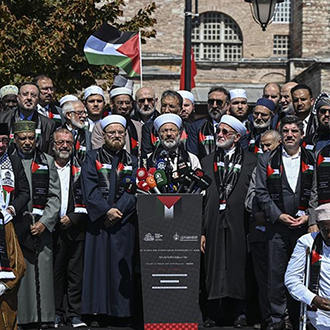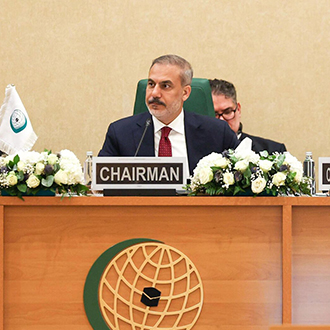Words from the root “s-l-m” appear in 140 places in the Qur’an. These words often carry the profound meaning of “success in this world and salvation in the Hereafter”. In this context, the essence of Allah’s name “as-Salam” (the peace) is a constant presence, accompanying us from our very first breath until our final moments, and even beyond, to the Day of Resurrection (Maryam, 19:15-33). Peace and salvation in this world are for those who follow the guidance of Allah (Ta-Ha, 20:47). Allah blessed all His messengers with peace and wished them well-being. After the flood, Prophet Nuh’s (Noah) ark was guided to safety and they disembarked it with the greeting of peace (Hud, 11:48), and the fire was commanded to be cool and safe for Ibrahim (Anbiya, 21:69). We are commanded to use this greeting of peace each time we enter our homes as a wish for prosperity, abundance, and well-being (Nur, 24:61). Greeting with the name “Salam” is considered a hallmark of being a Muslim (Nisa, 4:94). Furthermore, when encountering individuals involved in trivial activities or those who engage in teasing others, we are asked to wish them peace and move away (Qasas, 28:55; Furqan, 25:63). As a blessing from Allah, the Laylat alQadr is a night on which peace and blessings are showered on the earth until the break of dawn (Qadr, 97:5). In fact, angels take the lives of the righteous by saying, “Peace be upon you!” (Nahl, 16:32; Ahzab, 33:44) Heaven is described as the Home of Peace (Salam) (An’am 6:127), and only patient servants will attain this peace (Ra’d, 13:24; Furqan, 25:75). Paradise will be entered “in peace” (Hijr, 15:46; Qaf, 50:34); Allah will greet those who are in Paradise with “Peace” (Ya-Sin, 36:58), and they will greet each other with the word “Salam” (Peace) (Yunus, 10:10; Ibrahim, 14:23). The greeting of peace and serenity will resonate throughout the heavens (Maryam, 19:62; Waqi‘ah, 56:26). In the Qur’an it is informed that on the Day of Judgment, nothing will benefit us except “a pure heart” (Shu‘ara, 26:89). According to al-Qushayri, a pure heart is one that is clean, sound, and free from resentment and hatred. This state can only be achieved by surrendering the heart to Allah alone and eliminating shirk (polytheism), hatred, the filth of sins, and the feeling of opposition to Allah. A pure heart is a spiritual and moral structure devoid of hatred, treachery, malice, or envy, and the person who possesses it has goodwill toward all Muslims.
“Islam”, which is derived from the same root as the name “as-Salam” denotes unconditional submission and obedience to Allah (Hujurat, 49:17). Islam, encompassing the meanings of silm (peace) and salamah (salvation), can be defined as “a path of submission that promises peace in this world and salvation in the Hereafter”. From this point of view, “Islam” is the ultimate embodiment of the name “as-Salam”. The concept of “taslimiyyah” (submission), also stemming from the same root, is one of the meanings that constitute the essence of Islam, the religion of Allah. Complete submission to Allah is commanded in numerous verses (Nisa, 4:65; An’am, 6:14; Hajj, 22:34; Ghafir, 40:66; Ahzab, 33:56; Zumar, 39:54); it is stated that the highest piety can only be attained through submission (Nisa, 4:125); and only those who submit themselves to Allah can enter Heaven (Baqarah, 2:112). The entire universe has submitted to Allah, and salvation is only attainable through submission (Al-i ‘Imran, 3:83).
The word “Muslim” originates from the same root as the name “as-Salam” and refers to both avoidance of evil and submission to Allah, and thereby attaining salvation. Thus, the Muslims in whom Allah’s name “as-Salam” is manifested are, in the words of our Prophet, people “from whose hand and tongue people are safe (who do not harm anyone in any way)”.
To foster and maintain social cohesion, it is imperative that love, trust, and peace predominate among people. Personal and social achievements can only flourish in such peaceful environments. To ensure and maintain this environment, which is the manifestation of the name as-Salam, our Prophet (saw) commanded us to pay attention to greeting each other with this name of our Lord, signifying supplication for each other. When we greet each other with Allah’s name as-Salam, we beseech Allah for all the goodness encompassed by this name and supplicate for our interlocutor.
Those who truly reflect this noble name emerge as beacons of peace and well-being in their communities. No one suffers the slightest harm from them. In the face of difficulties arising from the obstinacy of others, they demonstrate remarkable patience. They engage neither in frivolous disputes with the unwary nor in unproductive struggles with the ignorant. They resolutely avoid any conduct that diminishes human dignity. These individuals conduct themselves as exemplary figures, living lives free from blemish. Their demeanor is marked by solemnity, dignity, and honor. They exist in harmonious integration with the inherent order and balance of existence. Such individuals have achieved a state of peaceful equilibrium with all aspects of their being and their surroundings. They have attained salvation, existing in a state of inner tranquility while fostering peace in those around them.









